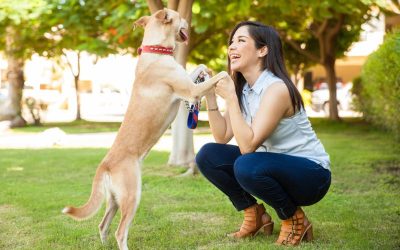Bringing a puppy into your home is an exciting and rewarding experience. However, one common challenge that new dog owners often face is puppy biting. It’s natural for puppies to explore the world with their mouths, but it’s important to teach them appropriate biting behavior to prevent it from becoming a habit. Luckily, puppy behavior training can provide the guidance you need to handle biting issues effectively.
In Surprise, AZ, where puppies are often exposed to new environments and interactions, early puppy training is essential for establishing good habits.
Why Puppies Bite
Puppies typically bite for several reasons, including teething, exploring their environment, seeking attention, or trying to play. While some degree of biting is natural, it’s important to teach your puppy what is appropriate. Unchecked biting can lead to problematic behaviors that are harder to correct as your puppy grows older.
1. Teething and Mouth Exploration
Much like human babies, puppies go through a teething phase where they chew on things to relieve discomfort. During this time, puppies may chew on furniture, toys, or even human hands. It’s crucial to recognize that teething is a phase, but the behavior must be redirected.
2. Playfulness and Attention-Seeking
Puppies often bite as part of their play behavior. They might nip at your hands, arms, or legs to get attention or to initiate playtime. While playful biting is common, it can be problematic if the puppy doesn’t learn when and where it’s appropriate to use their mouths.
3. Lack of Boundaries
Some puppies bite out of a lack of understanding about boundaries. If they’re not taught proper bite inhibition early on, they may continue the behavior as they grow older, which can lead to more serious issues, especially around strangers or other animals.
Effective Puppy Behavior Training Techniques
To stop puppy biting and establish good behavior, you need a structured approach. Puppy behavior training focuses on teaching your puppy self-control, bite inhibition, and the right way to interact with people and objects. Here are some proven techniques that can help you address puppy biting:
1. Redirect the Biting Behavior
One of the most effective ways to stop a puppy from biting is to redirect the behavior to something more appropriate. If your puppy starts nibbling on your hand, immediately offer them a chew toy or a bone. This not only distracts them from biting you but also teaches them that chewing on toys is acceptable, while biting humans is not.
Be consistent with this approach—every time your puppy starts to bite, offer a toy or bone instead. Over time, they will learn that biting people does not lead to playtime, but chewing on toys will.
2. Use Positive Reinforcement
Positive reinforcement is a key component of any successful puppy training program. When your puppy refrains from biting or chews on the appropriate items, reward them with praise, affection, or a treat. This will reinforce the desired behavior and help your puppy associate not biting with positive outcomes.
For example, if your puppy starts to chew on their toy rather than your hand, immediately praise them or give them a treat. This encourages your puppy to continue that behavior and will help them understand what you expect.
3. Teach Bite Inhibition
Bite inhibition is the ability of a dog to control the force of their bite. It’s an essential skill for puppies to learn in order to prevent harmful or painful bites in the future. One method for teaching bite inhibition involves letting out a sharp, high-pitched yelp when your puppy bites too hard. This mimics the sound of other puppies when they’re being too rough, signaling that the bite was too strong.
Once the puppy stops biting after hearing the sound, give them positive reinforcement for stopping. If they continue to bite, try turning away and stopping play to signal that biting leads to the end of interaction. This teaches your puppy that biting too hard results in loss of attention or playtime.
4. Avoid Punishment
While it can be frustrating to deal with a biting puppy, it’s important to avoid using punishment as a method of training. Yelling at or physically punishing your puppy can create fear and confusion, which can lead to more behavioral issues down the line. Instead, focus on redirection, positive reinforcement, and teaching bite inhibition.
Using calm and consistent methods will help your puppy learn more effectively and foster a positive bond between the two of you.
5. Establish Consistent Training Routines
Consistency is key when it comes to puppy behavior training. Set aside time each day to work on training with your puppy. This can include practicing basic obedience commands, working on bite inhibition, or engaging in interactive play sessions. The more consistent you are with training, the faster your puppy will learn appropriate behavior.
6. Enroll in Puppy Training Programses
If you’re dealing with puppy biting or other behavioral issues, enrolling in a training program can offer valuable support. Professional trainers can help you identify the cause of the biting and provide customized guidance to address it. In Surprise, AZ, Trusted Dog Training offers expert programs focused on puppy behavior and obedience, helping you tackle common challenges like biting and teething.
The Importance of Early Socialization
Early socialization plays a critical role in preventing puppy biting issues. Exposing your puppy to new people, other dogs, and different environments in a controlled and positive manner can help them develop good manners and appropriate behavior. Well-socialized puppies are less likely to develop anxiety or aggression, which can contribute to excessive biting later on.
During socialization, make sure your puppy interacts with other dogs in a safe and supervised manner. Puppy trainings or playgroups are great opportunities for your dog to learn proper behavior while building their confidence.
Get Started with Puppy Behavior Training
Puppy biting is a normal behavior, but it’s important to address it early on to ensure it doesn’t become a long-term issue. With the right training techniques, patience, and consistency, you can teach your puppy to stop biting and develop good behavior that will last a lifetime.
For expert guidance and support, consider enrolling in Trusted Dog Training programs in Surprise, AZ. With professional trainers, you can set your puppy on the right path and ensure a happy, well-behaved companion for years to come.
Visit Gooddog Dog Training LLC to learn more about puppy behavior training and get started with effective training techniques today.


